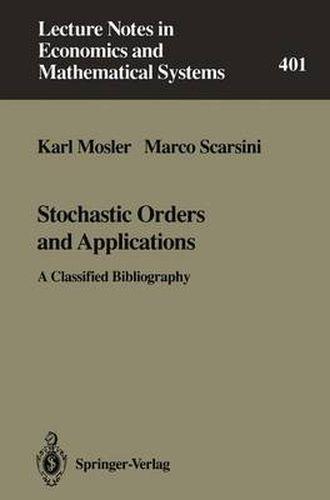Readings Newsletter
Become a Readings Member to make your shopping experience even easier.
Sign in or sign up for free!
You’re not far away from qualifying for FREE standard shipping within Australia
You’ve qualified for FREE standard shipping within Australia
The cart is loading…






This title is printed to order. This book may have been self-published. If so, we cannot guarantee the quality of the content. In the main most books will have gone through the editing process however some may not. We therefore suggest that you be aware of this before ordering this book. If in doubt check either the author or publisher’s details as we are unable to accept any returns unless they are faulty. Please contact us if you have any questions.
A bibliography on stochastic orderings. Was there a real need for it? In a time of reference databases as the MathSci or the Science Citation Index or the Social Science Citation Index the answer seems to be negative. The reason we think that this bibliog raphy might be of some use stems from the frustration that we, as workers in the field, have often experienced by finding similar results being discovered and proved over and over in different journals of different disciplines with different levels of mathematical so phistication and accuracy and most of the times without cross references. Of course it would be very unfair to blame an economist, say, for not knowing a result in mathematical physics, or vice versa, especially when the problems and the languages are so far apart that it is often difficult to recognize the analogies even after further scrutiny. We hope that collecting the references on this topic, regardless of the area of application, will be of some help, at least to pinpoint the problem. We use the term stochastic ordering in a broad sense to denote any ordering relation on a space of probability measures. Questions that can be related to the idea of stochastic orderings are as old as probability itself. Think for instance of the problem of comparing two gambles in order to decide which one is more favorable.
$9.00 standard shipping within Australia
FREE standard shipping within Australia for orders over $100.00
Express & International shipping calculated at checkout
This title is printed to order. This book may have been self-published. If so, we cannot guarantee the quality of the content. In the main most books will have gone through the editing process however some may not. We therefore suggest that you be aware of this before ordering this book. If in doubt check either the author or publisher’s details as we are unable to accept any returns unless they are faulty. Please contact us if you have any questions.
A bibliography on stochastic orderings. Was there a real need for it? In a time of reference databases as the MathSci or the Science Citation Index or the Social Science Citation Index the answer seems to be negative. The reason we think that this bibliog raphy might be of some use stems from the frustration that we, as workers in the field, have often experienced by finding similar results being discovered and proved over and over in different journals of different disciplines with different levels of mathematical so phistication and accuracy and most of the times without cross references. Of course it would be very unfair to blame an economist, say, for not knowing a result in mathematical physics, or vice versa, especially when the problems and the languages are so far apart that it is often difficult to recognize the analogies even after further scrutiny. We hope that collecting the references on this topic, regardless of the area of application, will be of some help, at least to pinpoint the problem. We use the term stochastic ordering in a broad sense to denote any ordering relation on a space of probability measures. Questions that can be related to the idea of stochastic orderings are as old as probability itself. Think for instance of the problem of comparing two gambles in order to decide which one is more favorable.